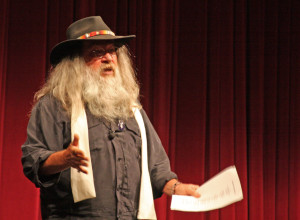by Martha Quillen
Republicans and Democrats seldom agree on anything, and Congress is determinedly divisive. But what about us? Do we still agree on America’s founding principles? Do we still believe in the proposition that all men are created equal? And that people have certain inalienable rights, among them Life, Liberty, and the Pursuit of Happiness?
Today those ideals seem increasingly fanciful, as our political positions keep devolving into screeds and insults – which reminds me of an argument directed my way 36 years ago. It was a minor dispute over a largely irrelevant topic, but it stuck with me, primarily because it was leveled with withering contempt by someone who was ordinarily gracious.
I was working a temp job at a newspaper when a high school English teacher, who was on sabbatical and working as a reporter, mentioned Kafka’s Metamorphosis.
“I loved that story,” I said. But the teacher declared that it had very little literary value. At which point, the others in the office admitted that they had liked it, too.
“Why?” he demanded, and a discussion ensued.
Metamorphosis relates the tale of Gregor Samsa, a dutiful son and brother, who has experienced a terrible transformation. Gregor is the family’s breadwinner, but suddenly he can’t leave his room, which leaves his family struggling to cope. His mother cries, his father rages and his sister tries to care for him, until it becomes clear that Gregor isn’t going to recover. Then they start contemplating his murder.
I love Metamorphosis because it’s so horrifying and yet funny. Others admire its concepts and symbolism.
For those unfamiliar with the story, it begins, “As Gregor Samsa awoke one morning from uneasy dreams he found himself transformed in his bed into a gigantic insect.”
Poor Gregor has become a large, brown, hard-shelled bug, with “numerous legs.” Kafka doesn’t dwell on the cause of his bizarre transformation; instead he narrows in on the characters’ reactions. The story is about feeling inferior, alienated, ashamed and guilty, and also about family and societal obligations, and what happens to people who are unable to fulfill them.
Or at least that’s what I thought Metamorphosis was about, until the teacher corrected me. He told us that we only liked Metamorphosis because we didn’t understand it. According to him, it was not about Gregor’s trials and tribulations. It was a Freudian tale about how anxiety and paranoia make Gregor dysfunctional and dependent.
“Are you sure?” I asked, because the story seems to be sympathetic about Gregor’s plight.
But the teacher was adamant, and declared that it was common knowledge that Metamorphosis is a Freudian allegory.
Our conflicting viewpoints hardly mattered. What made me remember the incident was the teacher’s reaction. He was really annoyed with us, and that wasn’t typical. At the time, I suspected that the staff’s appreciation for Kafka had somehow made him feel like an outsider, which he was. The teacher ordinarily lived in a big Midwestern city, was a decade or so older than most of us, and dressed considerably better than we did.
The rest of the newspaper staff was a ragtag band of ski bums, aspiring artists and Hunter Thompson wannabes. But we all liked the teacher, and he clearly loved living in a Colorado ski town and hanging out with his coworkers and the local movers and shakers. (I guess you don’t get to talk to your mayor and council members very often in major metropolitan areas.)
That was 36 years ago, before the Internet and today’s easy access to almost limitless information. But I didn’t actually read Kafka again until a few weeks ago. Afterwards I Googled Metamorphosis, and realized that educators don’t agree about what it means, but pretty much all of them believe it reflects Kafka’s concerns about the alienating qualities of modern life (or as modern as life was in 1912 when he wrote it).
That should have vindicated my perspective on Metamorphosis but instead the plethora of Internet commentary made me realize that the teacher and I had both ignored many of the story’s more trenchant themes. Yes, it’s about anxiety, paranoia, expectations and obligations, but it’s also about class, authority, inequality, freedom, the young versus the old, the traditional versus the new, and the importance of human dignity and autonomy.
But mostly it’s about who should run your life. The teacher indicated that it was Gregor’s own fault if he couldn’t. But Kafka apparently felt that modern life was creating alienation, isolation and unjust pecking orders.
I’m not entirely sure how modern life does that. But presuming Kafka was right? If life in 1912 could make you feel like an insect, just think about how much more dehumanizing life can be today: Now that the world is home to seven billion people (compared to less than two billion in 1912). Now that people’s jobs are expendable and exportable. Now that technology is advancing so rapidly that people have to scramble to keep up.
And here in modern America it doesn’t help that blatant insults pass as politicking. Or that our candidates keep haranguing us about our marriages, birth control, attitudes and lifestyles as if we were wayward children in need of moral instruction.
But what can we expect? In the United States, our public dialogue has gotten so clamorous and scathing that it erodes our faith in freedom and equality.
But America’s premise of equality isn’t based on the idea that we will all miraculously become equal in fortune, intelligence, talent and luck. It is based on the idea that our governmental systems at every level should serve ordinary citizens as well as they serve the elite and powerful – which they clearly do not.
Americans talk about values, but they repeatedly ignore and pervert the common values our country was founded on. Clearly our dedication to equality does not imply that we get to make everyone conform to our select standards. And our commitment to democracy does not suggest that we can vote on what other citizens can think. And our commitment to freedom and justice does not let us force our personal beliefs upon our fellow citizens.
And thus, in retrospect, I think the teacher was right about Gregor (although not about Kafka). The Gregors of this world are complicit in their mistreatment, and that has got to stop. At some point, we have to stand up and say, “No. We will not let you make us feel like cockroaches anymore.”
In fact, we have got to get rid of this extraordinary notion that it is somehow helpful to band together politically to make people feel like cockroaches.
So enough with the campaigning about what’s wrong with cohabitation, gay partners, Muslims and people who don’t believe in global warming. By all means, if you don’t like what your fellow citizens are doing, post it on Facebook or complain about it in bars.
But when it comes to governance? It’s one thing to say, “Hey, I really, really don’t like skeet shooting.” But it’s another thing entirely to launch a political campaign to try to outlaw it. That is clearly bullying and a total disregard for other people’s freedoms.
Freedom and justice are America’s common national values, so let’s promote them. And if we fail and end up feeling like cockroaches despite our best efforts?
Then we’ve got to remember that sometimes screeds and insults make you feel like a cockroach and you’ve got to resist and object – and remind yourself that it’s far worse to treat others like cockroaches and not even realize it.
Martha Quillen searches for values in the hills of Chaffee County and occasionally finds enormous beetles.



